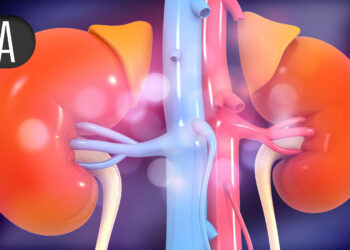Newborn screening for genetic metabolic diseases helps a portion of children stay healthy as they grow, but decompensation episodes still occur in the first weeks after birth before test results come back, a new study by German researchers in Pediatrics found.
The American Academy of Pediatrics recommends all newborns undergo screening for metabolic conditions like phenylketonuria (PKU), maple syrup urine disease (MSUD), and mitochondrial trifunctional protein deficiency (MTPD) within 48 hours after birth.
The study followed 257 children with an identified metabolic condition from screening in the first days following birth to a median age of 13.7 years. A little over 70% never exhibited symptoms of their disease identified through screening, but the remainder did develop permanent symptoms. Approximately 81.4% of the children had normal IQs, and over 90% attended regular schools. Other conditions included in the analysis were long-chain 3-hydroxyacyl-CoA dehydrogenase deficiency (LCHADD) and isovaleric aciduria (IVA).
Researchers also analyzed data of children with disorders other than PKU (n = 154) and found nearly 45% experienced a metabolic decompensation, defined by a hospitalization stay because of a related symptom such as hypoglycemia or acidosis, within the first 28 days of life. Nearly half of these episodes occurred even before screening results were available.
“This study illustrates that while newborn screening can identify neonates at risk of metabolic disease, there are still limitations,” said Amy Kritzer, MD, clinical chief of the Division of Genetics and Genomics and director of the Metabolism Clinical Program at Boston Children’s Hospital in Boston. Kritzer was not involved in the study.
Certain diseases were more likely to cause complications. All children (n = 38) with more severe forms of conditions like MSUD (> 90% in the first 28 days) and LCHADD/MTPD (> 80% in preschool) developed a metabolic decompensation requiring hospitalization. During a median follow-up period of 13 years, the latest metabolic decompensation was reported at a median age of 6.6 years (range, 0-19.3).
Those with milder versions of conditions like IVA and very long-chain acyl-CoA dehydrogenase deficiency more often remained symptom-free.
The study highlighted the importance of diagnosing a metabolic condition early on and adhering to prescribed diets and medications. Among participants, 84.3% maintained good adherence, which was associated with fewer complications and higher cognitive scores (P = .0027).
“The goal of newborn screening is not to eliminate all metabolic decompensations,” said Kritzer, who was not involved in the study. “Rather, it is to allow for identification of these individuals so that therapy can be initiated rapidly.”
While the current study only tracked children in Germany, researchers said they plan to use international databases to better measure the benefits of screening over time and highlight areas that need improvement.
“My primary motivator is to optimize and improve newborn screening iteratively by the insights that studies on the long-term outcomes provide,” said Ulrike Mütze, MD, a metabolic pediatrician and associate professor in the Center for Pediatric and Adolescent Medicine at Heidelberg University Hospital in Heidelberg, Germany, who led the study. “We aim to minimize harm and further improve the benefit of [newborn screening].”
Newborn screening programs in the United States began in the early 1960s, spearheaded by microbiologist Robert Guthrie, MD, who spent much of his career at the University of Buffalo in Buffalo, New York, and developed a bacterial inhibition assay for PKU. Since then, screening has expanded nationwide, and every state mandates newborn screenings, though the specific conditions tested vary by state.
Still, Mütze noted, many limitations to the current newborn screening method persist.
“Newborn screening might never be able to prevent all metabolic decompensations, but our data shows that the process — sampling, transportation, analysis, communication of the result, and first intervention — has to be regularly evaluated to be optimized and to keep its quality high,” said Mütze.
To improve prevention rates, some clinicians are leveraging technologies such as gas chromatography-mass spectrometry, a urine-based screening method, to expand the detection of metabolic disorders.
“We can also use rapid genomic sequencing to identify inherited metabolic diseases if there is diagnostic uncertainty following the newborn screen, but even these results may not return prior to decompensation for certain high-risk neonates,” said Monica Hsiung Wojcik, MD, MPH, director of the Neonatal Genomics Program at Boston Children’s Hospital.
Wojcik said genomic sequencing during pregnancy can also be used to identify inherited metabolic diseases before birth.
“We have had some families where, via prenatal diagnostic testing, we already know the diagnosis before the baby is born and are able to initiate treatment immediately after birth to prevent decompensation,” said Wojcik.
Kritzer, Wojcik, and the study researchers reported no relevant disclosures.
Lara Salahi is a health journalist based in Boston.
Source link : https://www.medscape.com/viewarticle/early-metabolic-screening-shows-long-term-benefits-2025a10006j2?src=rss
Author :
Publish date : 2025-03-19 08:04:00
Copyright for syndicated content belongs to the linked Source.














